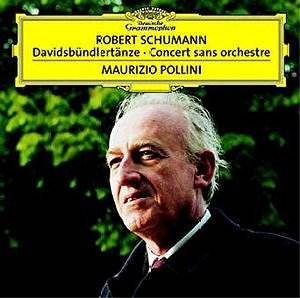Maurizio Pollini elected to live with the Davidbündlertänze
for many, many years before recording them; a wise choice that
has reaped many dividends in the present release. The constantly
shifting nature of Schumann’s music seems to appeal to Pollini,
and it is no surprise therefore to learn that the eighteen contrasting
pieces that make up this collection are given a peerless, magisterial
performance. The very confidence Pollini exudes is breathtaking
and he is always entirely at the service of this wonderful piece.
The Davidbündlertänze performance
goes a long way towards refuting the oft-heard suggestion that
Pollini is an over-literal interpreter. Listen to the half-voiced
second movement (‘Innig’) or the sweetly sung fourteenth (‘Zart
und singend’) for full refutation of that assertion. Whether it
be in a disembodied waltz or in Schumann’s characteristic dotted
rhythms, one is constantly reminded that Pollini is the most secure
of guides to Schumann’s music. Only (and this will, admittedly,
come as no surprise to this pianist’s detractors) in the twelfth
movement (marked ‘Mit gutem Humor’) does Pollini fall short. His
over-serious reputation here seems to bear aural fruit.
Pollini opts for the first edition, published
by Robert Friese in Leipzig in 1837. There are many, but minor,
changes to the usual edition used (1851, Schuberth). More serious
are the textual issues with the Concert sans orchestre,
which comprises three of the five movements composed for the Piano
Sonata No. 3 in F minor. Two scherzos are omitted, in fact one
restored by the composer in an 1853 revision; the other posthumously
published by Brahms in 1853. Pollini himself is quoted in the
booklet notes, referring to the success of the concentrated listening
experience of the Concert sans orchestre.
Again, Pollini provides a truly convincing performance.
Live, it is even more so (at least, at the Festival Hall when
I heard him, it was), but that is not to imply that this DG recording
will be in any way unsatisfactory. The grand scale of his conception
is heard from the very start, together with a focused attention
to detail and a crystalline clarity. It is difficult to state
which is the most successful movement, as the second (Quasi
Variazioni. Andantino de Clara Wieck), a set of variations
on a funereal theme of Clara’s, is imbued with a tender mystery,
its quixotic changes of mood fully in keeping with Schumann’s
character, while the finale (Prestissimo possibile) is,
indeed, extremely fast, but with the ‘possibile’ judged
in relation to the possibilities of the musical content. Even
in the shortest staccato, Pollini never ‘jabs’ at notes; his control
is always enormously compelling (listen to his left hand about
4’40).
Although the playing time may appear short, this
is a disc to return to again and again for sovereign musical illumination.
Colin Clarke

